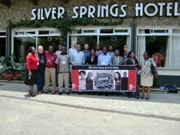Adding value to trade union work in Africa

The Project sponsored by LO-FTF and UNI Graphical on Best Practices on OHS and HIV/AIDS held its evaluation seminar in Kenya from September 21 to 23.
Attending the Workshops were trade union delegates from Zambia, Uganda, Ghana, Tanzania and Kenya, also in attendance were Joergen Assens and Joergen Holst from LO-FTF, Bjarne Nielsen Vice President of HK Denmark, Keith Jacobs UNI Africa, Adriana Rosenzvaig UNI Strategic Campaigns and Organising and Steve Walsh from UNI Graphical.
The seminar was opened by the President of Kupripupa Br Mwondi, who in his address spoke of the importance of this Project to unions in Africa and how the work had impacted on the lives of African workers.
He said it was critical that we continue to include in our CBA’s clauses on Health and safety and HIV/AIDS
Bro Bjarne Nielsen from HK Denmark spoke about the importance of International solidarity and how proud his union was to be part of this Project and that over the next few days we need to work together to continue to bring about change and have an impact on union policies and practices
Steve Walsh as Head of Department for UNI Graphical also welcomed participants and said how important it is to evaluate the program in a transparent way.
The context of the seminar was set by both Sister Adriana and Bro Joergen Assens who referred to the historical and strategic approach of the Project over the last 10 years.
Participants broke into Workshops by country to develop presentations on what the key achievements have been around the following issues:
- Improved working conditions
- CBA’s including development of clauses on OHS and HIV/AIDS
- Increased union membership
- Improved dialogue with employers
- And whether the Project has had
- Impact on union policies or practices
- Impact on legislation or enforcement of OHS
- Impact outsider the graphical sector
- Lessons learned
And what could we have done differently:
Each country gave a comprehensive report on their progress and a plenary session was held at the conclusión of the country reports.
It was very clear from the reports and the high level of debate in the plenary session that significant progress had been made, notwithstanding some of the many dificulties that affiliates had experienced over the life of this Project.
A summary of the first day showed:
- A greater awareness of OHS among
- Workers
- Employers
- Improved Social dialogue
- Increased Recruitment
- As an organising tool
- Ongoing visibility of unions
- Able to influence legislation in government
- This identified a lack of enforcement which in turn has led to
- Inclusión in CBA’s of clauses dealing with OHS and HIV/AIDS
- Increased visibility of trade unions and added value for society
- Education and training
- OHS has become embedded in the work of trade unions
Through the Project a capacity has been developed by the unions to seek critical improvements in OHS and HIV/AIDS through the companies and the government.
It has improved International solidarity and assisted in the development of Networks and created greater links between unions in Africa.
On day 2 following a presentation from Bjarne Nielsen on the experiences of the Denmark union HK Private around globalisation and social dialogue the participants identified what the challenges and the priorities are in a health and safety context.
Challenges identified were technology, chemicals, accessability to treatment, redundancies, regional integration and how to maintain a strong network.
The priorities identified included the sharing of information, strategic planning and activities, train the trainers, effective lobbying of governments and integrating OHS in workplace structures.
The final day of the workshop provided the opportunity for a critical analysis of where we are, where we want to be and how do we get there.
In summarising the seminar Steve Walsh highlighted the consistent themes which had emerged from the discussions and the inputs from all participants, they were:
- Definite link between organising and OHS
- Great opportunity to network both internally and externally
- Very important to include OHS clauses including on HIV/AIDS in CBAs
- Lobby respective governments to have OHS and HIV/AIDs recognised as part of the national agenda and for proper legislation protecting workers to be implemented
Next steps:
- Put into action the discussions of the last 3 days
- Maintain and improve our networking and Communications
- Continue the training and education of shop stewards, activists and members
The Vice-President of HK Private Bjarne Neilsen said in closing that all of us want to enable our members to have good and safe working conditions in our workplaces.
We have to go back to our own workplaces and spread the message, develop our shop stewards and deliver the message as simply as we can.
Alone we are weak but by doing it together we are strong.
For any further question please contact: steve.walsh@uniglobalunion.org

